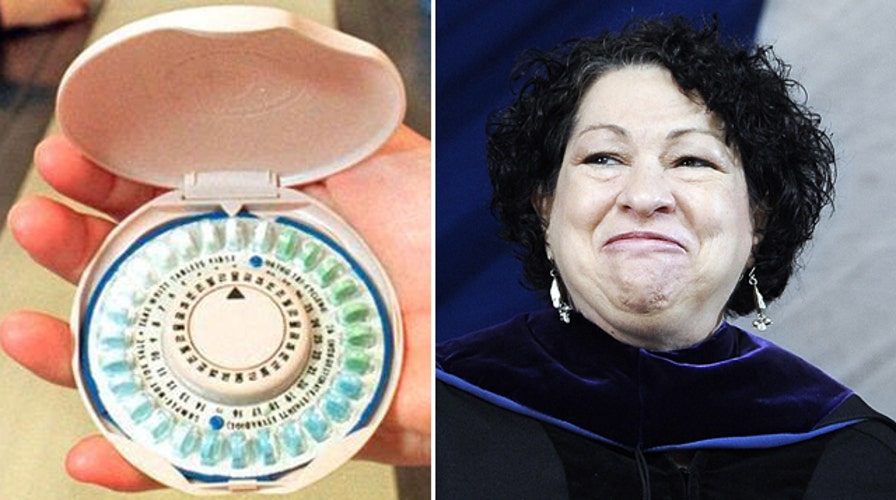Supreme Court Justice Sonia Sotomayor has put religion at the forefront of the ObamaCare debate by offering a reprieve to some Catholic groups who want to opt out of the Affordable Care Act's contraceptive mandate.
Sotomayor issued the order late Tuesday, one day before major parts of the health care law went into effect.
In her order, Sotomayor said the government is temporarily prevented from enforcing contraceptive coverage requirements against the Denver-based Little Sisters of the Poor Home for the Aged and must respond by 10 a.m. Friday.
The White House responded Wednesday, saying the group isn’t subject to the requirement because it doesn’t apply to self-funded church plans.
The White House said the Justice Department has already made clear the mandate doesn’t apply to such organizations and that it defers to the agency on litigation matters.
“But [we] remain confident that our final rules strike the balance of providing women with free contraceptive coverage while preventing non-profit religious employers with religious objections to contraceptive coverage from having to contract, arrange, pay, or refer for such coverage,” the White House said.
But Sotomayor's decision to delay the contraceptive portion of the law was joined by the U.S. Court of Appeals for the District of Columbia Circuit, which also issued an emergency stay for Catholic-affiliated groups challenging the contraceptive provision, including the Archdiocese of Washington, D.C., and Catholic University.
Separately, Lawyer Noel J. Francisco had said in appeals to Chief Justice John Roberts and Justice Elena Kagan that the mandate would "expose numerous Catholic organizations to draconian fines unless they abandon their religious convictions and take actions that facilitate access to abortion-inducing drugs, contraceptives and sterilization for their employees and students."
The law requires employers to provide insurance that covers a range of preventive care, free of charge, including contraception. The Catholic Church prohibits the use of contraceptives.
The Supreme Court in 2012 upheld the constitutionality of the core of the Affordable Care Act, saying its insurance mandate and the tax penalty enforcing it fell within the power of Congress to impose taxes.
The Obama administration crafted a compromise, or accommodation, that attempted to create a buffer for religiously affiliated hospitals, universities and social service groups that oppose birth control. The law requires insurers or the health plan's outside administrator to pay for birth control coverage and creates a way to reimburse them.
That isn't enough, Francisco said.
"In short, under the accommodation, applicants must authorize their third party administrators or insurance companies to provide the very products and services they find morally objectionable," he said. "Suffice it to say, the 'accommodation' does not resolve applicants' religious objection to participation in this regulatory scheme."
Roberts and Kagan handle emergency requests for the U.S. Court of Appeals for the Federal Circuit and the Sixth Circuit. They can act by themselves or involve the rest of the court.
Francisco said that if Catholic organizations don't comply with the law, they face "fines of $100 a day per affected beneficiary" and if they drop their health care coverage, "they will be subject to an annual fine of $2,000 per full-time employee after the first 30 employees, and/or face ruinous practical consequences due to their inability to offer a crucial health care benefit to employees."
He added: "In short, applicants are faced with a stark choice: violate their religious beliefs or pay potentially crippling fines."
More than 90 million individuals participate in health plans excluded from the scope of the mandate, Francisco said. "The government, however, has steadfastly refused to create a broader religious exemption, either for individuals seeking to run their businesses in accordance with their faith or for nonprofit religious organizations beyond houses of worship," he said.
On Wednesday, Missouri Republican Sen. Roy Blunt applauded Justice Sotomayor's move.
“The Obama administration's HHS mandate is an egregious and blatant violation of the religious freedom that Americans have enjoyed for more than 220 years since the ratification of the First Amendment,” he said. “No American should be forced to surrender their religious freedom or abandon their deeply held religious beliefs.”
The justices have already agreed to rule on whether businesses may use religious objections to escape a requirement to cover birth control for employees. The court will consider two cases involving Hobby Lobby Inc., an Oklahoma City-based arts and crafts chain with 13,000 full-time employees, and Conestoga Wood Specialties Corp., a Pennsylvania company that employs 950 people in making wood cabinets.
Hobby Lobby won in the lower courts while Conestoga Wood Specialties lost. The combined cases probably will be argued in late March with a decision coming by summer.
Fox News' Shannon Bream, Joseph Weber and The Associated Press contributed to this report.





